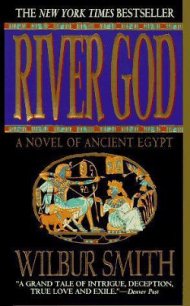Men of Men - Smith Wilbur (онлайн книга без txt) 📗
"Don't come near me," she husked through her tears, and she retreated before him. "Please don't touch me."
He came on, lean and rangy as an old torn-leopard; but the cruel and swarthy planes of his face had softened with an expression she had never seen upon them before, and his one good eye held her swimming green ones with a deep and tender concern.
"Don't, oh please don't, "Now she held up both hands as if to ward him off, and she turned her face away. She had reached the end of the verandah; her back was pressed to the door of the bedroom which Cathy and Salina had once shared, and she began to pray, her voice muffled by her own tears.
"Oh Gentle Jesus, help me to be strong-" His hands fell upon her shoulders; they were hard as bone and cool through the thin cotton of her blouse. She shuddered, and gasped.
Have pity. I beg you. Let me be."
He took her chin in the cup of his hand and forced her face up to his.
"Will you give me no peace, ever?" she mumbled brokenly, and then his mouth covered hers and she could not speak again. Slowly the rigidity went out of her body, and she swayed against him. She sobbed once, and began to slump into the embrace of his hard muscled arms. He caught her behind the knees, and around the shoulders, and lifted her like a sleeping child against his chest.
He kicked open the door to the bedroom, stepped through and pushed it closed with his heel.
There was a dustsheet on the bed, but no pillow or eiderdown. He laid her upon it, and knelt beside her, still holding her to his chest.
"He was a saint," she choked. "And you sent him to his death. You are the very devil."
Then with the shaking, frantic fingers of a drowning woman, she unfastened the mother-of-pearl buttons down the front of his linen shirt.
"His chest was hard and smooth, the olive skin covered with crisp, dark curls. She pressed her open lips to it, breathing deeply the man-smell of him.
"Forgive me," she sobbed. "Oh God, forgive me."
From his cubbyhole beside the pantries, Jordan Ballantyne could overlook the cavernous kitchens of Groote Schuur.
There were three chefs at work over the gleaming, anthracite-burning Aga ranges, and one of them hurried across to Jordan with the enamelled double-boiler and a silver spoon. With it Jordan tasted the Beamaise sauce that would go with the galjoen. The galjoen was a fish of the stormy Cape waters; fancifully its shape could be likened to that of a Spanish galleon, and its delicate greenish flesh was one of the great African delicacies.
"Perfect," Jordan nodded. "Parfait, Monsieur Galliard, comme toujours." The little Frenchman scurried away beaming, and Jordan turned to the heavy teak door leading to the wine cellars below the kitchens.
Jordan had personally decanted the port that afternoon, ten bottles of the forty-year-old Vilanova de Gaia of the 1853 vintage; it had faded to the beautiful tawny colour of wild honey. Now a Malay waiter in long white Kanzu robes, with crimson sash and pillbox fez, came up the stone steps, reverently carrying the first Waterford glass decanter on a Georgian silver tray.
Jordan poured a thimbleful into the chased silver tastevin which he wore on the chain about his neck. He sipped, rolled it on his tongue and then drew breath sharply through pursed lips to let the wine declare itself.
"I was right," he murmured. "What a fortunate purchase."
Jordan opened the heavy leatherbound wine register, and noted with pleasure that they still had twelve dozen bottles of the Vilanova, after he had deducted today's decanting. In the "remarks" column he wrote. "Extraordinary. Keep for best," and then turned back to the Malay steward.
"So then, Ramallah, we will offer a choice of Sherry Finos Palma or Madeira with the soup, with the fish the Chablis or the 1889 Krug -" Quickly Jordan ran down the menu, and then dismissed him. "The company will be coming through presently, kindly see that everyone takes their places now."
The twelve waiters stood with their backs to the oak panelling of the dining-hall, their white-gloved hands clasped in front of them, expressionless as guardsmen, and Jordan gave each one a quick appraisal as he passed, looking for a stain on the brilliant white robes or a sloppily knotted sash.
At the head of the long table, he paused. The service was the silver gilt queen's pattern presented to mister Rhodes by the directors of the Chartered Company, the glass was long, finely stemmed Venetian, lipped with twenty-two carat gold to complement the gilt. There were twenty-two settings this evening, and Jordan had agonized over the seating arrangements. Finally he had decided to place Doctor Jameson at the bottom of the table and put Sir Henry Loch, the High Commissioner, on mister Rhodes" right. He nodded his satisfaction at that arrangement, and took one of the Alphonso Havanas from the silver humidor and sniffed it before crackling it against his ear, that too was perfect; he replaced it and took one last lingering look around the hall.
The flowers had been arranged by Jordan's own hands, great banks of protea blooms from the slopes of Table Mountain. In the centrepiece, yellow English roses from the gardens of Groote Schuur, and of course mister Rhodes' favourite flowers, the lovely blue plumbago blossom.
From beyond the double doors came the clatter of many feet on the marble floor of the hall and, the high, almost querulous, voice which Jordan knew and loved so well carried to him.
"And we shall just have to square the old man." Jordan smiled fondly at the words, the old man was certainly Kruger, the President of the Boer Republic, and "square" was still one of the central words in mister Rhodes" vocabulary. just before the doors swung open to admit the company of brilliant and famous men clad in sombre dinner jackets, Jordan slipped out of the hall, back to his little cubbyhole, but he raised the hatch beside his desk an inch, so that he could hear the conversation at the long, glittering table in the hall beyond.
It gave him a glorious feeling of power, to be sitting so close to the centre of all this and to listen to the pulse of history beating, to know that it was within him subtly to alter and direct, and to do so in secrecy. A word here, a hint there, even something so trivial as the placing of two powerful men side by side at the long dinner table.
On occasions, in privacy, mister Rhodes would actually ask, "What do you think, Jordan?" and would listen attentively to his reply.
The tumultuous excitement of this life had become a drug to Jordan, and barely a day passed that he did not drink the heady draught to the fill. There were special moments that he treasured and whose memory he stored. When the meal ended, and the company settled down to the port and cigars, Jordan could sit alone and gloat over these special memories of his.
He remembered that it had been he who had written out that legendary cheque in his own fair hand for mister Rhodes to sign the day that they had bought out the Kimberley Central Company. The amount had been 5,338,650 pounds, the largest cheque ever drawn anywhere in the world.
He remembered sitting in the visitor's gallery of Parliament as mister Rhodes rose to make his acceptance speech as Prime Minister of Cape Colony, how mister Rhodes had looked up and caught his eye and smiled before he began speaking.
He remembered after that wild ride down from Matabeleland when he had handed the Rudd Concession with Lobengula's seal upon it to mister Rhodes, how he had clasped Jordan's shoulder and with those pale blue eyes conveyed in an instant more than a thousand carefully chosen words ever could.




